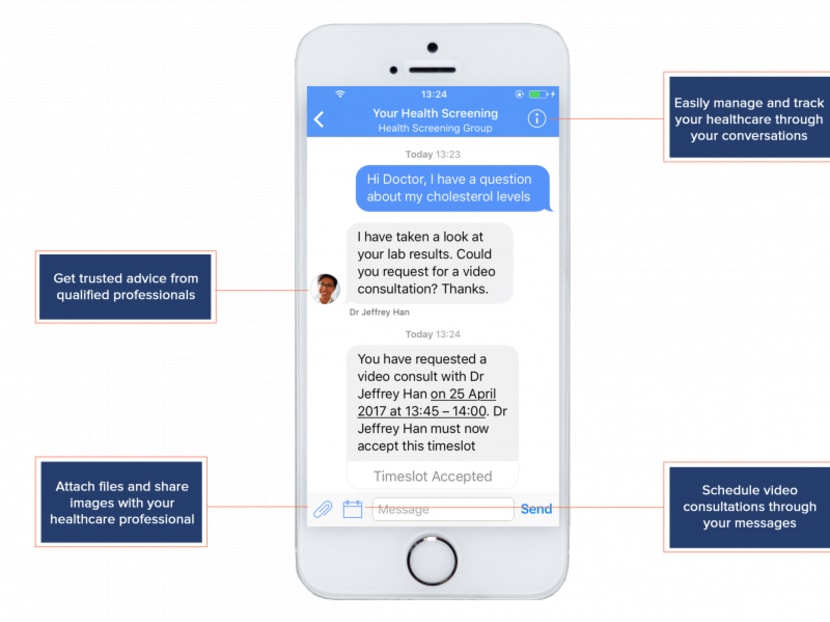Seeing the doc online? Some physicians advise caution
SINGAPORE — As platforms offering virtual health consultations and electronic medical certificates (e-MCs) extend their reach, some doctors are calling for stronger safeguards to uphold standards and deter individuals from exploiting loopholes with greater ease.
SINGAPORE — As platforms offering virtual health consultations and electronic medical certificates (e-MCs) extend their reach, some doctors are calling for stronger safeguards to uphold standards and deter individuals from exploiting loopholes with greater ease.
Virtual consultations make it easier for some individuals to doctor-hop and fake illnesses to get medical certificates, they said. The proportion of fees paid by patients that is pocketed by platform providers – typically one-third of the total sum – also raises concerns of fee-splitting, which breaches ethical guidelines set out by the Singapore Medical Council (SMC).
The advantages of platform providers such as Doctor Anywhere and MyDoc include greater convenience — they allow patients to cut the queue and have consults on-the-go. The providers say their partner doctors are experienced professionals who know when an MC is warranted.
Telemedicine is also a key part of the nation’s push for a more sustainable and cost-efficient healthcare system in the longer term.
Doctor Anywhere was launched two weeks ago and offers video consultations with family doctors, who are subsequently able to issue e-MCs. Its co-founder Jeffrey Fang said about 20 doctors have signed up so far.
Telemedicine is not meant as a replacement for in-person consultation, but works for medical reviews, follow-up visits and for non-urgent medical advice, he said. It is best when part of a “long-term treatment plan”, said Mr Fang, who said his company is working with clinics to “manage congestion and create more positive outcomes” for doctors and patients.
Aside from family doctors, Doctor Anywhere is looking to include psychologists and lactation consultants in its pool of healthcare practitioners available for consults. It also plans to start an on-demand house-call service.
MyDoc started in 2012 and is in the midst of testing its e-MC service among “select groups of users”, said founder Snehal Patel.
Its medical team meets and trains all doctors it works with to “ensure that they understand the product well and to ensure the quality of patient experience”, he said. MyDoc works with doctors from Acumed Group, L&C Medical Group and other clinic chains. The app has over 50,000 registered users, including 30,000 active ones comprising the policyholders of its insurer partners and employees of firms that use its health screening services.
“We have made it very clear that MyDoc can be used for most outpatient services and follow-ups, but isn’t an alternative for all forms of medical treatment,” said Dr Patel.
While the traditional mode of obtaining an MC after a physical examination is not foolproof, doctors say online platforms make it easier for users to fake illnesses.
There is no way for doctors to confirm if platform users are having the purported symptoms, said Dr Jeremy Chan, whose clinic is in Toa Payoh.
Another general practitioner, Dr Leong Choon Kit, believes e-platforms should only be used in consultations with regular patients.
“Patients can do multiple e-consultations with different doctors until they get the diagnoses or prescriptions they want,” said Dr Leong, who sits on the SMC. “Also, if there is any trouble (after the consultation), it will be hard to trace and find recourse.”
Doctor-hopping on e-platforms would result in further fragmentation of patient records and go against the authorities’ goal for each Singaporean to have his or her own family doctor, said Dr Jack Tan, medical director of Northeast Medical Group, which operates nine clinics.
Doctor Anywhere’s Mr Fang, however, believes e-platforms can encourage doctors to be “even more vigilant” in disbursing MCs.
“We want to be responsible practitioners as a platform and make sure there are safeguards in place,” he said.
Another bugbear of some doctors is the lack of transparency over the cut of patient fees that go to the app providers.
Doctor Anywhere charges S$30 for a 10-minute consult and takes one-third of the fee, while MyDoc declined to reveal how much of a fee it takes.
According to the latest SMC ethical code and guidelines, doctors should pay managed care, insurance and patient referral service providers fees that reflect actual work done, and must not pay fees that are so high as to constitute fee-splitting or fee-sharing.
If such fees are passed on to patients, the patients should be told.
“These figures ought to be made clear to patients, especially after the SMC came down hard on fee structures for third-party administrators,” said Dr Chan. Doctors are now barred from paying fees to these administrators, which help process medical claims, that are calculated as a percentage of fees that doctors charge their patients.
“These medico-legal and fee-splitting aspects need to be looked into before widespread adoption of these services,” said Dr Tan. Until teething issues are sorted out, telemedicine platform providers should not be allowed to hire in-house doctors to do teleconsultations, he said.







